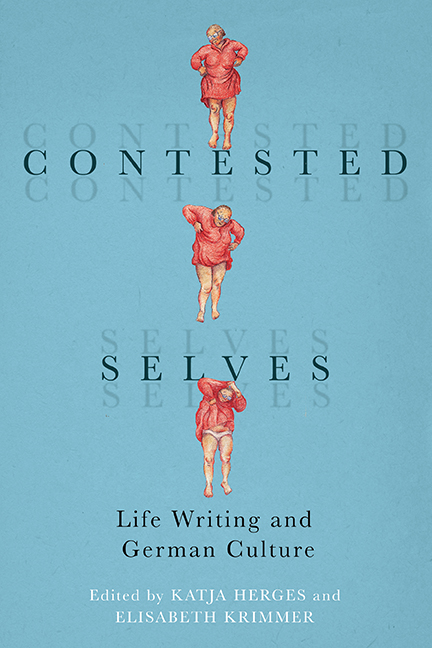Book contents
- Frontmatter
- Contents
- Acknowledgments
- Introduction
- Part I Women’s Life Writing, Female Subjectivity and Agency
- Part II Modern Life Writing and Aesthetics
- Part III Trauma and Vergangenheitsbewältigung
- Part IV Transnational and Transgenerational Life Writing in Contemporary Germany
- Bibliography
- Notes on the Contributors
- Index
12 - Homeland, Nation, and Gender in the Life Writing of German and Jewish Émigrés
Published online by Cambridge University Press: 26 May 2022
- Frontmatter
- Contents
- Acknowledgments
- Introduction
- Part I Women’s Life Writing, Female Subjectivity and Agency
- Part II Modern Life Writing and Aesthetics
- Part III Trauma and Vergangenheitsbewältigung
- Part IV Transnational and Transgenerational Life Writing in Contemporary Germany
- Bibliography
- Notes on the Contributors
- Index
Summary
Ideological expressions have never been pure fictions; they represent a distorted consciousness of realities, and as such they have been real factors that have in turn produced real distorting effects.
—Guy Debord, The Society of the SpectacleGO BACK WHERE YOU CAME FROM!” This is a sentence I heard innumerable times in several languages and in various locations, including the place I “come from.” Yet I was never sure if it referred to the city of my birth (Istanbul), the nation-state I was born in (Turkey), or my mother's (European/Austrian) uterus. The notorious desire of institutions but also of people I encountered in ordinary situations, waiting for a train or in a coffeehouse, to hear a simple answer and categorize accordingly, seemed to me—even if it was well intended—abstruse, and so did my various responses. The application process to a US university, for example, was confusing, and I am pretty sure that I responded to the query about my “ethnicity” by falsely claiming to be “Caucasian” and “mixed.”
In the following I explore the relation between ideological premises and conceptions of this seemingly gray area of identity, with a focus on national identity, in three autobiographical works: Ruth Klüger's memoir weiter leben: Eine Jugend (1992; Still Alive: A Holocaust Girlhood Remembered, 2001) and the graphic memoirs Letting It Go (2013) by Miriam Katin and Belonging: A German Reckons with History and Home (2018) by Nora Krug. The formation and re-formation of the nationstate, often accompanied by forced displacement, ethnic cleansing, and genocide, is inextricably linked to the creation and definition of a collective national identity and to the exclusion of an “Other” from this identity. This dialectic reached an exceptionally violent climax in the Third Reich with the systematic, industrial murder of millions of individuals who were expelled from the Volksgemeinschaft, the German collective. Klüger, who was born in 1931 and experienced exclusion and systematic mass murder firsthand, shows skepticism toward a rigid understanding of identity and reveals the ephemerality and alterability of identity categories. Katin, who was only one year old when Hungary was occupied by the Nazis, illustrates the process of overcoming her former view of the German nation; letting the past go means reflecting on fears and preconceived notions and requires elasticity in one's understanding of the “self.”
- Type
- Chapter
- Information
- Contested SelvesLife Writing and German Culture, pp. 248 - 270Publisher: Boydell & BrewerPrint publication year: 2021



